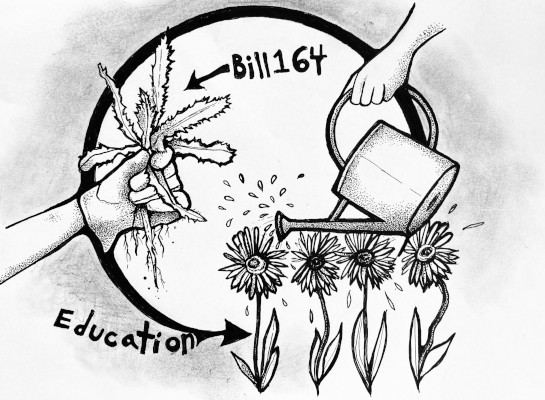Bill 64 is no more
Unpopular education bill withdrawn, uncertainty remains

Gabrielle Funk
After a summer of seeing “Stop Bill 64” lawn signs across Manitoba and much organized opposition, Bill 64 is dead. Earlier this month, Manitoba’s interim Premier Kelvin Goertzen announced the cancellation of the unpopular education reform legislation spearheaded by his predecessor.
In his first press conference as premier, Goertzen said this move is “really ... about setting that clean slate for a leader.”
The controversial Bill 64 would have eliminated democratically elected school boards, replacing them with government appointees, giving the ruling provincial government control over education. The bill was heavily criticized, with detractors pointing to former premier Brian Pallister’s minimization of the harm caused by residential schools as an example of why politicians shouldn’t set the educational standard.
Matt Henderson, assistant superintendent of the Seven Oaks School Division, is pleased with this move, saying the timing of Bill 64 during a pandemic was not ideal.
“Now that it has been scuttled by the interim premier, we are now able to focus on the safety of everyone within our schools and begin to make significant plans for the next five and 10 years that are focused on getting better at what we do,” he says.
Going forward, Henderson hopes that Manitoba’s education policy will focus on ensuring a “fair and equitable funding model, so that all learners have the means to flourish.” Furthermore, he says “it is imperative that we remove barriers for learners to engage in deep learning experiences.”
“This means a focus on the (Truth and Reconciliation Commission) calls to action, ensuring that we are pursuing significant pathways to eliminating racism and equipping educators with the skills and knowledge necessary to design experiences where learners can ask significant questions about the universe,” Henderson says.
“There also needs to be a focus on ensuring that all learners have access to high-quality instruction predicated on formative feedback and which leads to critical pathways to post-secondary and the world of work.”
Given the vocal and organized opposition to Bill 64, which proved to be successful, Manitobans might be more engaged in the public-education system going forward.
“As our society faces many challenges, the resistance to Bill 64 is an example of a diverse group of people that cares deeply about education and the nurturing of a just and sustainable society,” Henderson says.
“The critical mass demonstrated in the past two years is a lesson in democracy – and a lesson that I hope we infuse in our teaching.”
Goertzen, as an interim premier, will not put forth any major policies in the next two months. Minister of Education Cliff Cullen confirms this is an email to The Uniter.
“The process of putting a pause on governance provides myself, as the Minister of Education, and the Department of Education the opportunity to continue to work in partnership with educators, parents, students and stakeholders to create an education system that works for Manitoba,” he says.
“Educators, parents, students and Manitobans agree that we need to improve educational outcomes,” Cullen says, adding that the “work isn’t over.”
Heather Stefanson, Shelly Glover and Shannon Martin, the three candidates vying to be leader of the Progressive Conservative Party and Premier of Manitoba, have yet to announce their proposed education policies.
Published in Volume 76, Number 2 of The Uniter (September 16, 2021)






